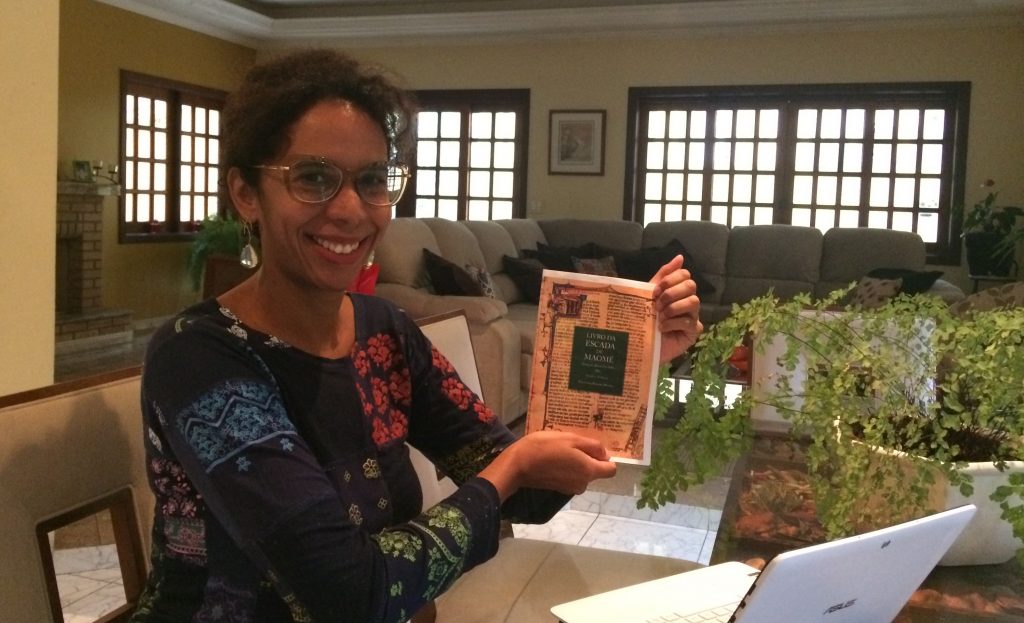São Paulo – The Divine Comedy, written between 1300 and 1321 by Italian author Dante Alighieri became one of the most famous works from the Middle Ages. But what if this work was heavily inspired by other authors? Arab authors. “This poem, which became the icon of Christianism, in fact is full of Arab influence. This is noteworthy to show the influence of the Arab and Islamic culture in European literature. In the case of Dante, particularly, is astonishing, because it is, practically, the main medieval work, the most known,” underscored the researcher and PhD student at University of Porto, Portugal, Fernanda Pereira Mendes (picture above), in an interview to ANBA.
The Brazilian researcher, who currently lives in Portugal, will launch the first translation into Portuguese of The Book of Muhammad’s Ladder. The book gathers texts in Arabic and is key to identify the similarities between its excerpts and the ones that would have been reproduced in the classic The Divine Comedy. The translation into Portuguese will be launched in February 2019 in Portugal and in Brazil. “The Divine Comedy was inspired by a great work. Nowadays, amid all this anti-Islamic bias, it is a recovery of these fruitful ties. Two literary canons, which shine a light on a historical period where coexistence was alive, with the Jewish people also,” says Mendes.
The coexistence period with the Arabs and Moors began around the 8th century at the Iberian Peninsula, leaving the so-called Al-Andalus legacy. “In that time, there was a coexistence between the peoples in the Peninsula, Portugal and Spain territories nowadays, it was a miscegenated culture in a way,” pointed the researcher that, then, found out about the Arab influence in The Divine Comedy. “Dante is recognized as a genius, but due to the expulsion of Arabs, people relegated their influence in European culture. Thus, Dante’s work wasn’t properly studied. This influence is not properly described.”
The Book of Muhammad’s Ladder
To get to the hands of the Italian author, the Arab manuscripts got first into the hands of scholars, probably Jewish and religious scholars, which presumably did the translations, reveals Mendes. She says that The Book of Muhammad’s Ladder could have gotten into the hands of European scholars after the translations done by King Alfonso X of Castile and León, who was a member of the Toledo school of translators. It was the noble king who translated the work, from the Arabic to Castilian, Latin and French, according to Fernanda.
Dante was born in 1265, while the translation by Alfonso X is from 1264, as revealed by the researcher. “The translation spread from Spain to other places, one of them being Tuscany, where Dante lived. We know that now because of testimonies left in monasteries by religious scholars in their writings, most of them dated,” she explained.
Just like in the Italian poem, the Arab story describes how its main character, Muhammad, visits places in heaven and hell, guided by another character, the angel Gabriel. “There are passages very similar. You cannot just say that it is not, see? It is undeniable. The passages about heaven are a little different, but the passages about hell have excerpts that are the same, such as a sinner being punished that is turned into ashes and then into himself again, for the whole day, in both works. It is not just a coincidence,” emphasizes the researcher.
Even before The Book of Muhammad’s Ladder was discovered, a visionary had identified the Arab influence. He was Miguel Asín Palacios, a Jesuit priest that lived in Spain. “He would identify a parallelism between the Dominicans and the Sufi, both monastic orders. The Sufi had visions, for instance, and in the manuscripts found in Arabic and in Latin there were such narratives,” explained Fernanda. “Palacios identified this in excerpts of authors such as Ibn Arabi (Arab author) and conducted studies proving that The Divine Comedy would repeat whole plot points. He went farther and said that this narrative was very famous in the Middle Ages and that Dante was familiar with it,” she said. The Sufi are not exactly monastic, since there are no such orders in Islam, but certain followers of this school, such as the Dervishes, can be considered as the ones that resemble the monks the most among the Muslim.
At the time, Palacios was accepted into the Royal Spanish Academy for his work, considered scholarly and sound. “But it was a scandal because Europe was colonizing the Arab countries. To the Italians, thus, a controversy, divergence was created,” says Fernanda. Only in 1949, two Dante scholars found the manuscripts of The Book of Muhammad’s Ladder, in two translations: in Latin, found in the Vatican and in Paris (France), and in Old French, found in Oxford (England).
Translations into Portuguese
To publish and translate The Book of Muhammad’s Ladder into Portuguese, she specifically chose the year 2019, since it marks the Centennial of Palacio’s work and the 800 years of Dante. In the 1990s, the work had been translated into Spanish, French, Italian and English. “Portugal is also part of the Al-Andalus legacy. Many people forget the close relations that have always existed between the Western and Islamic cultures. They forget these historical periods and the contribution by the Arabs and Muslim to world culture,” said the researcher. The work will be funded, in Portugal, by the University of Porto, and, in Brazil, by a partnership with the Arab Studies Center (CEArusp) of the University of São Paulo (USP).
Translated by Sérgio Kakitani




